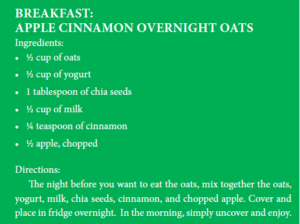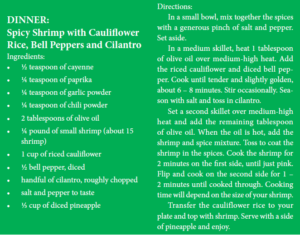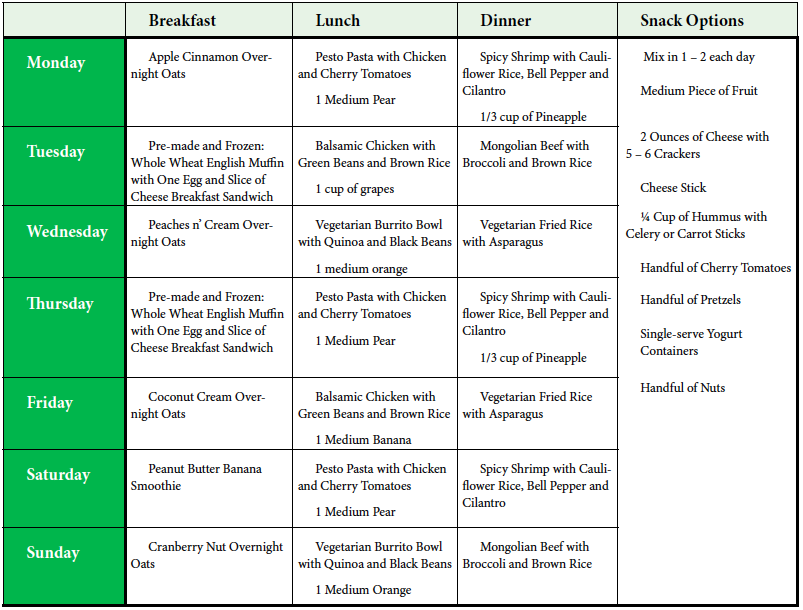Setting Realistic Goals For The New Year With a Weekly Meal Plan and Recipes

Story, Recipe, and Photos by Kaitlin Hill
From reducing blood pressure and risk of cancer to promises of better sleep, mood, and sex, it is no mystery why year after year “Healthier Eating” tops the charts of New Year’s resolutions.
Though as popular as the resolution may be, it is a difficult one to maintain. In fact, studies show that 80% of resolution makers throw in the towel as early as February.
In his article, “You Should Start Practicing Your New Year’s Resolutions Now,” New York Times journalist Harry Guinness argues that the “new year, new me” everyone chases is doomed to fail for a few reasons. He writes, “[The resolutions] are either too vague to be useful or too hard to get done, so they don’t motivate you.” He adds, “A big part of it is that many people take on too much, too fast. By resolving to eat nothing but salads, run five miles to work every day and get in three gym sessions in a week – plus write that novel they always wanted to – in January, the month right after the holidays, they are setting themselves up to fail dramatically.”


Guinness believes another factor of failure is the “all or nothing” approach, a phrase that rings particularly true when attempting to eat healthier. Registered Dietician Daniel Olbrych describes the thought process as, “The reason why [clients] discontinue their healthy eating is that if they fall off track, they feel the damage is done and that they can’t reverse the damage, so they might as well eat whatever they want.”
To break the cycle and stick to your wellness goals, Olbrych recommends a two-pronged approach. Have a reason and have a plan. He says, “In terms of sticking to goals long term, we found that most people were motivated by one idea: fitting into old clothes, they want to be alive to see grandchildren grow up or maybe they need to lower their cholesterol.” He adds, “Figure out what your true motivator is and remind yourself of that often so you can stay on track.”


Having a plan comes in handy, too, and Olbrych recommends weekly meal prepping as a way to save time, eat healthier, and avoid excuses. He explains, “You can make meals ahead of time that are proper portions of healthy food.” He adds, “You can make a bunch of meals on Saturday or Sunday which eliminates the excuse of ‘well I don’t have time to make healthy food during the week.’”
And while meal prepping doesn’t sound as sexy as juicing or Keto, it is an easy lifestyle change that makes the vague and lofty New Year’s Resolution of “healthier eating” much easier to accomplish.
While every person’s nutritional needs are different, for Olbrych “healthier eating” isn’t based on Instagram-able trends or magic potions but rather the advice parents have provided for years – less sugar, more fiber and most importantly, “we want half your plate at most meals to be fruits and vegetables,” Olbrych explains.


More than listening to age-old advice from our parents, Allison Tepper, a Leesburg-based MS, RD, LDN and RYT, says it is equally important to listen to our bodies. “Our bodies are really smart. We tend to use external cues to guide our food choices rather than internal ones.”
“I really follow the philosophy of intuitive eating and paying attention to those body cues…Think about what has been challenging for you and where you want to start making some shifts so that it is manageable and sustainable for the rest of your life.”
For Tepper, a healthier attitude is just as vital as healthier habits. She says, “The big, big part of it is the mindset around food versus the willpower. How are you talking to yourself about food? If you don’t do something perfectly, do you get down about it and make the day spiral? If it didn’t go exactly as planned, that’s okay.”

Guinness, Olbrych, and Tepper might agree that it isn’t the resolution-makers in need of change but the resolutions they make. This year, set goals that are easier to stick to and have a plan, but most importantly forgive setbacks and remember to enjoy food and life. With that in mind, Olbrych offers a suggested meal plan, proving that eating healthier doesn’t have to be complicated and can still be delicious. ML
This article first appeared in the January 2020 issue of Middleburg Life.


